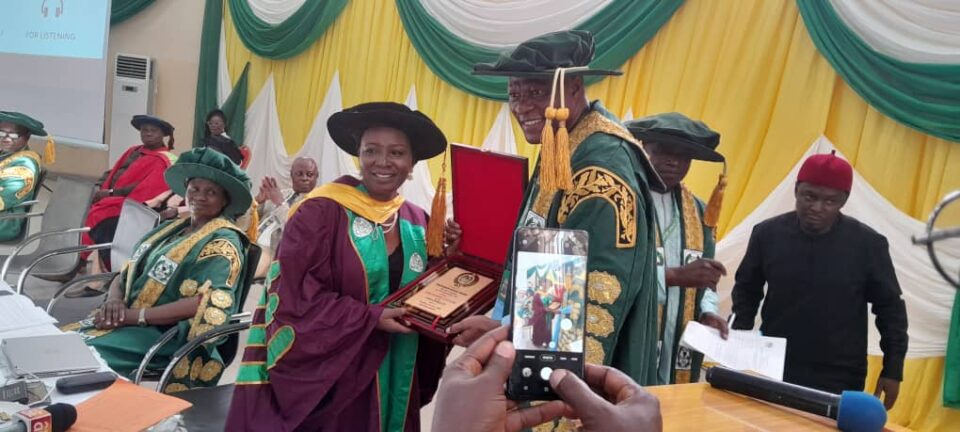By Felix Khanoba
A Professor of Geography at the University of Abuja (UniAbuja), Rhoda Mundi, has called on Nigerian government to leverage on the potentials of the increasing population in the country to bring about the desired productivity and development.
Mundi, who made the call while delivering the 41st Inaugural Lecture of UniAbuja on Thursday, listed various measures that can be taken by government to maximise the benefits of high population growth .
Speaking on the topic, ‘The Paradox Of Population Growth In National Development’, the Kaduna State-born Geography Professor said with appropriate policies, Nigeria’s population will be a catalyst for development.
Mundi, who specialises in population and development called on government to ensure good governance at all levels by upholding meritocracy, even as she harped on the need to conduct census for adequate planning.
“Government to provide the necessary funds and seek for assistance from relevant development partners for the conduct of a national population and housing census and strengthen other sources (vital registration systems) of demographic data collection for evidence-based planning.
“Government at all levels needs to make concerted efforts to invest in the population through provision of education, health, and other infra- stractures. Investing in education will enhance the knowledge and skills of the population for better performance and productivity.
“Investing in health wil translate to investing in the quality of population for a healthier and more focused workforce with lower morbidity and mortality. With sound investment in the population, the country stands to benefit from the demographic dividend.
“Government to strengthen policies that will discourage brain drain and encourage brain gain so that the country can benefit from her vast human resources.”
She, however, expressed concern that the Nigeria’s population has been growing at an alarming rate as a result of several reasons including early age at marriage, low use of contraception, consideration of children as a source of security and labour, among others.
“Given the current growth rate of Nigeria’s population, the population will double in about 29 years. Unfortunately, there are no up-to-date data on the population size, distribution, and characteristics to guide planning.
” Nigeria’s population will continue to grow for some time notwithstanding the programmes put in place because of the in-built momentum of growth. In addition, the reasons for high population growth have not abated,” Mundi posited.
While lamenting the human development index for Nigeria is low, with the country ranked 163 out of 191 countries, Mundi said the nation’s huge population can serve as a catalyst to development through provision of labour force, provision of market for the sale of goods and services.
” Nigeria’s vast human resources have not been sufficiently invested in as evidenced by the low literacy and educational levels.
” The impact of high population growth in Nigeria is both at the individual and national level, Specifically, it impacts on levels of savings and investment, maternal and infant mortality, health, education, and the economy.
” Nigeria has vast potentials for development, but it is hampered largely by bad governance, inadequate data for planning, poor investment on the population, slow implementation of policies and insecurity,” she said.
Also speaking, chairman of the event and Vice Chancellor of UniAbuja, Professor Abdul-Rasheed Na’Allah, said Nigeria stands to gain a lot from the inaugural lecture as it would soon ranked as the third most populous country in the world behind China and India.
Na’Allah, however, expressed concern that the despite the population growth being witnessed in the country, productivity continues to fall, even as he called on relevant authorities to reverse the ugly trend.
“As far as I am concerned, I don’t see population as a crisis. Everybody needs to work. At least each person will produce what three persons will eat. If you work in your maximum, each person should be able to produce what three people or four will eat,” the VC said.
Professor Na’Allah, who described Mundi as an erudite scholar, commended her for delivering a powerful inaugural lecture that will impact positively on the country.
The Vice Chancellor also assured the university’s community that inaugural lectures will henceforth be rolled out regularly as parts of the institution’s contribution to the society.
The inaugural lecture which attracted distinguished Nigerians from far and near – including Catholic Bishop, Hassan Kukah, former UniAbuja’s VC, Professor Nuhu Yakubu, National Population Commission chairman, Nasir Kwarra, among others, also witnessed presentation of plaque to Professor Mundi.



